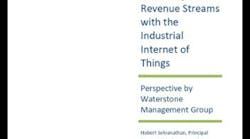Smart Industry: What is the focus of this white paper?
Hubert: The IIoT offers a tremendous opportunity for industrial product manufacturers to unlock new revenue streams via smart connected products (SCPs). Several industrial bellwethers are already in the market with SCPs (John Deere, Caterpillar, Rolls Royce) and the industry as a whole is grappling with what these new offerings mean, both in terms of revenue potential and business implications. What is clear is that making the transition to offering SCPs can be very difficult, as it calls on manufacturers to transform into technology companies. We wrote this paper to help industrial product companies understand the different types of SCPs currently in the market and what business and operational changes they must execute to successfully launch and operate an SCP business.
Smart Industry: Provide an example of how the IIoT unlocks revenue streams.
Hubert: A growing number of product manufacturers are turning to SCPs and services to drive new revenue streams. John Deere is a great case study on this. With solutions like its Field Connect System (a service that monitors farmland and provides external data and insights to improve crop yields), John Deere is taking to market data-as-a-service offerings in addition to selling farming equipment. Field Connect Service is being monetized through a subscription-pricing model, which is a fundamentally different approach than traditionally priced farming equipment.
Smart Industry: Are enterprises aware of the opportunities presented by the digital transformation?
Hubert: Absolutely! We’ve seen little doubt over the potential of IIoT and the digital transformation it drives for internal use cases as well as for external ones. Connected supply chains and connected factories are great examples of IIoT enabling digital transformation inside the company. With external use cases, providers of SCPs are driving a fundamentally different experience for their customers, in addition to transforming how services are delivered. As IIoT deployments continue to increase in scale, scope, and value delivered, we expect to see exponential expansion.
Smart Industry: What elements of the IIoT are being adopted most readily? What elements are not being exploited?
Hubert: Predictive and preventative maintenance have generated the most traction in termsSmart Industry: Is that a difficult mindset shift...transitioning from a manufacturer of things to a provider of smart connected products?
Hubert: It is a very transformative and challenging process to shift from selling typical manufactured products to smart connected products. It’s the kind of transformation that goes beyond just changing the type of products and services you sell. It changes the fundamentals of how a provider sells and how it organizes itself as a company. This involves a shift from selling pure hardware products and components to hardware and software. It changes your selling model from transactional sales to recurring revenue sales. It changes the fundamental touchpoints you have with your customers. In short, ready or not, becoming a provider of smart connected products means becoming a tech company.
For product manufacturers, all those changes can certainly sound daunting. Fortunately, these transformation challenges are not new. The technology industry itself has worked its way through these same challenges and opportunities as it has shifted to the cloud and as-a-service business models. As a result, there is a plethora of great lessons learned and best practices for manufacturers to study and adopt as they embark on their digital transformation. The key, naturally, is devising an effective, actionable plan to get you where you need to go.


